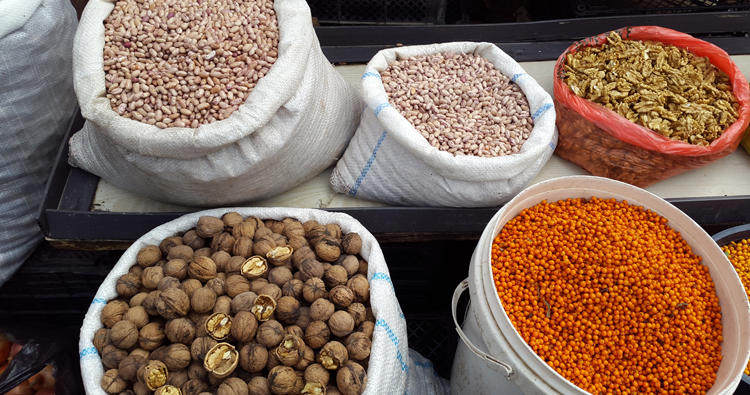How will the coronavirus outbreak impact Georgian economic growth?

Due to the coronavirus outbreak, Georgia might lose from $514 million to $2.01 billion as a result of the tourism sector suspension, writes the ISET Policy Institute. Photo: Nino Alavidze/Agenda.ge.

Georgian economic growth may drop to between 0.8 and 3.9 per cent this year, reports the ISET Policy Institute (ISET-PI), one of the first university-based think tanks in the South Caucasus based at the International School of Economics at Tbilisi State University (ISET).
ISET-PI predicts the decrease in real GDP growth will depend on how the crisis plays out.
ISET-PI gives three possible scenarios, according to which real GDP growth could fall to:
- Outbreak causes localized disruption – 3.91 per cent
- Widespread contagion – 1.91 per cent
- Global pandemic – 0.82 per cent
 Georgian economic growth may drop to between 0.82 and 3.91 per cent this year. Photo: Nino Alavidze/Agenda.ge.
Georgian economic growth may drop to between 0.82 and 3.91 per cent this year. Photo: Nino Alavidze/Agenda.ge.
Coronavirus influence on Georgian tourism sector
The Georgian economy lost from three to nine per cent of potential tourism revenue in February, show the preliminary calculations of the ISET-PI.
Tourism arrivals and receipts are expected to decline sharply as a result of the numerous travel bans, and due to precautionary behavior,” reports the ISET-PI.
 The Georgian economy lost from three to nine per cent of potential tourism revenue in February. Photo: Nino Alavidze/Agenda.ge.
The Georgian economy lost from three to nine per cent of potential tourism revenue in February. Photo: Nino Alavidze/Agenda.ge.
Due to the coronavirus outbreak, Georgia might lose from $514 million to $2.01 billion as a result of the tourism sector suspension, writes the policy institute.
ISET-PI discusses three possible scenarios where international, outbound or domestic tourism is suspended for specific periods of time and forecasts a possible loss of tourism revenue for the country.
 Georgia might lose from $514 million to $2.01 billion as a result of the tourism sector suspension. Photo: Nino Alavidze/Agenda.ge.
Georgia might lose from $514 million to $2.01 billion as a result of the tourism sector suspension. Photo: Nino Alavidze/Agenda.ge.
The scenarios are the following:
- March-May 2020: $514 million loss
- March-July 2020: $989 million loss
- March-December 2020: $2.01 billion loss
Will Georgian external trade decrease?
ISET-PI compares the current situation to the economic slowdown in the Eastern Europe and Central Asia (EECA) region in 2014-2017, caused by a drop in oil prices and global appreciation of the US dollar which “resulted in a sharp decline of external demand, falling commodity prices and regional currency crises.”
This crisis affected the Georgian economy, writes ISET-PI; the country’s goods exports fell by 23%, while imports contracted annually by 15% in 2015.Trade was only restored to the 2014 level by 2018.
The forthcoming crisis is expected to not only have stronger negative impacts on external demand, but also disruptions in the production value chains, affecting Georgia’s trade in more severe ways. Trade of all commodities, except food and medicine, is projected to decline, depending on the duration of the shock,” reports ISET-PI.
 The forthcoming crisis is expected to have negative impacts on Georgian trade. Photo: Nino Alavidze/Agenda.ge.
The forthcoming crisis is expected to have negative impacts on Georgian trade. Photo: Nino Alavidze/Agenda.ge.
Coronavirus effect on Foreign Direct Investments (FDI)
A decline in foreign direct investments (FDIs) is expected as the “investors prefer to invest in safe assets.”
Additionally, currency depreciation expectations will negatively affect FDI,” reports the ISET-PI.
FDIs in Georgia amounted to $1.26 billion in 2019 which was 7.1% of the gross domestic product (GDP) of the year.
What impact will coronavirus have on money remittances?
ISET-PI expects remittances to Georgia to decrease quite significantly as the country is among the top-receiving countries of foreign transfers.
Since all countries will suffer economically in the aftermath of the health and oil price crises, we expect significant slowdown in remittance inflows from the rest of the word,” writes the ISET-PI.
 In 2019, money transfer inflows in Georgia accounted for 9.8 per cent of GDP. Photo: Nino Alavidze/Agenda.ge.
In 2019, money transfer inflows in Georgia accounted for 9.8 per cent of GDP. Photo: Nino Alavidze/Agenda.ge.
The policy institute discusses three possible scenarios which are 10, 30 and 50 per cent decrease of net money transfers in March-December 2020. It means that Georgia might have $114 million, $372 million or $629 million loss in net money transfers during the following months.
What is the coronavirus influence on the global economy?
The latest Economic Outlook of the Organisation for Economic Co-operation and Development (OECD) discusses the Covid-19 impact on the global economy and expects a sharp slowdown in the global growth.
The global GDP growth of 2020 is projected to decrease to 2.4 per cent or even to 1.5 per cent which is half the rate projected prior to the coronavirus outbreak.
The coronavirus (COVID-19) outbreak has already brought considerable human suffering and major economic disruption,” reports the OECD.
The OECD writes about the adverse consequences of the coronavirus spread on the world economy noting “the direct disruption to global supply chains, weaker final demand for imported goods and services, and the wider regional declines in international tourism and business travel.”
 Tweet
Tweet  Share
Share